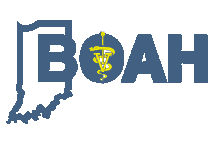Bret D. Marsh, DVM, Indiana State Veterinarian
Indiana State Board of Animal Health
Discovery Hall, Suite 100
1202 East 38th Street
Indianapolis IN 46205
Email: animalhealth@boah.in.gov
Phone: 317-544-2400 or 877-747-3038
Fax: 317-974-2011
Staff Directory and Map to the Indiana State Board of Animal Health
Animals have contributed a lot to Indiana's history, providing food, income, recreation, assistance and companionship to millions of Hoosiers every day. State lawmakers recognized the value of those relationships in 1889, when they created the office of the State Veterinarian and the Livestock Sanitary Commission.
Today, that commission, now known as the Board of Animal Health (BOAH), operates under the direction of an 11-member Board of animal industry professionals who meet quarterly to set agency policy.
While the original mission to "prevent and suppress contagious and infectious diseases among the livestock," has not changed in over 100 years, the scope of BOAH's work has expanded:
to enhance Indiana's economy by protecting Hoosiers' investment in animal agriculture, wildlife, horses and companion animals.
to protect public health by preventing and controlling the spread of animal diseases, such as rabies, which pose a threat to people.
to maintain a vital link in a safe food supply through the state meat and poultry and dairy inspection programs.
to help people and their animals who are victims of large-scale disasters such as floods and tornadoes.
Animal Health
Creating a healthy, disease-free environment for Indiana's 31 million animals is no small feat. BOAH's team of veterinarians and animal health inspectors travel to all corners of the state to investigate possible outbreaks of disease and advise animal owners about disease prevention.
Their efforts are vital to protecting Indiana's billion-dollar animal agriculture industry. Only by actively working to eradicate, control and prevent potentially economically devastating livestock diseases, will Hoosier farmers avoid domestic and international trade barriers. That's why the BOAH staff works closely with veterinarians, farmers, U.S. Department of Agriculture veterinarians and other states' animal health officials to monitor the health status of all animals crossing Indiana's borders. BOAH veterinarians also work closely with producers to develop strategies to eradicate existing diseases and prevent the introduction of new infections.
BOAH also regulates the care and handling of livestock being bought and sold in Indiana, by licensing and inspecting livestock market facilities, auction and renderers.
While animal agriculture has long been the focal point of BOAH, the growing number of pets in Indiana (almost two-thirds of Hoosier households claim at least one) has broadened the agency's focus. BOAH's Companion Animal/Equine Division monitors the overall health of the horse and small animal populations. Because these animals have the closest and most frequent contact with people, preventing the spread of diseases like rabies is part of protecting human health.
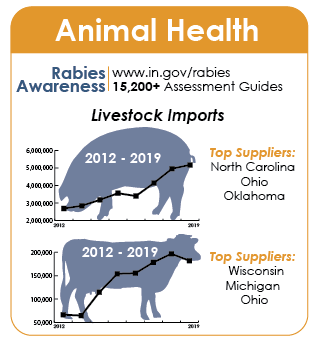
Food Safety
BOAH provides an important link in Indiana's food chain. Every day, BOAH inspectors scrutinize the cleanliness and handling of meat and poultry products in state-certified processing plants. The adoption of new, safer food-handling methods (known as HACCP) gives BOAH inspectors even more opportunity to identify any existing food-borne contaminates before the meat reaches the consumer. Meat and poultry products meeting Indiana's standards of inspection bear the Indiana legend mark.
BOAH dairy inspectors monitor the safety of Indiana milk from the farm production to milk transport to the dairy processing plant. Inspectors collect finished dairy products (i.e. yogurt, cheese, ice cream, or 2% milk) for harmful pathogen testing and quality standards every month. BOAH inspectors review plant test records that assure every load of milk tests negative for drug residues prior to unloading at a plant as part of consumer protection.
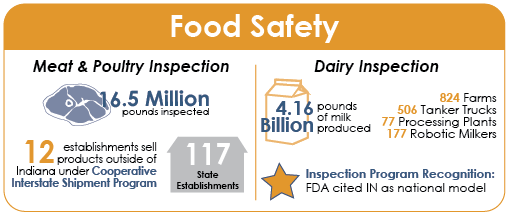
Disaster Preparedness
Where can animal owners turn for help during a flood or tornado?
BOAH's State Annex for Veterinary Emergencies (SAVE), now known as the Veterinary Medical Reserve Corps (MRC), was the first statewide emergency response network in the nation. Established in cooperation with the State Emergency Management Agency (SEMA), the MRC team responds to veterinary emergencies in Governor-declared disaster situations.
When a large-scale flood, tornado or other disaster strikes, specially trained veterinarians, technicians, and animal control personnel respond to the scene. Together, in a unique public-private partnership, they coordinate efforts to evacuate, rescue, treat and shelter animals in distress.
In fair weather, MRC's focus shifts to educating pet and livestock owners about the need to prepare for disasters.
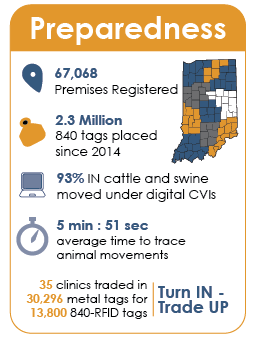
Animal Care
For many years, BOAH has played a role in the care and welfare of animals in Indiana. Beginning in the 1960s, the Meat & Poultry Inspection program has maintained standards of care for livestock going to slaughter as part of enforcement of the Humane Slaughter Act. Indiana extended the scope of those efforts in 1997 with stricter rules governing livestock markets, transporters and slaughter plants to ensure access to food and water, safer handling practices and a ban on slaughter of downed animals.
To support animal care further, the agency works closely with local law enforcement agencies and animal control to assist with investigations of abuse and neglect. BOAH veterinarians, at the request of a local agency, will make an on-site assessment of the animals in their environments. These resulting reports aid law enforcement officials with case investigations and outcomes.
In 2010, BOAH was formally tasked by the Indiana General Assembly to develop standards of care for livestock and poultry. That task was completed in 2011 with the adoption of Indiana's Standards for Animal Care.
The agency also manages the Commercial Dog Breeders and Brokers law for Indiana, which gives BOAH authority to inspect dog breeding facilities with more than 20 dogs older than 12 months.
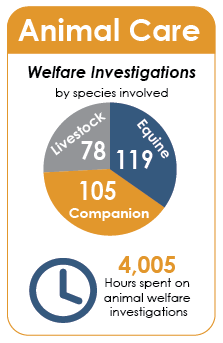
Indiana Transparency Portal
The state of Indiana has created the Indiana Transparency Portal (ITP) to give Hoosier taxpayers the opportunity to see state government spending and operations.
The ITP has information ranging from agency budgets to state contracts and agency performance measures.
Non-Discrimination Statement
The Indiana State Board of Animal Health prohibits discrimination in all its programs and activities on the basis of race, color, national origin, age, disability, and where applicable, sex, marital status, familial status, parental status, religion, sexual orientation, genetic information, political beliefs, reprisal, or because all or a part of an individual's income is derived from any public assistance program. (Not all prohibited bases apply to all programs.)
Persons with disabilities who require alternative means for communication of program information (Braille, large print, audiotape, etc.) should contact the Board of Animal Health at 317-544-2400. For relay services call 711 or 1-800-743-3333. See also: www.relayindiana.com
To file a complaint of discrimination write to Indiana State Board of Animal Health, State Veterinarian, 1202 E. 38th St., Discovery Hall, Suite 100; Indianapolis, IN 46205-2898 or call 317-544-2400.
The Indiana State Board of Animal Health is an equal-opportunity employer and provider.
